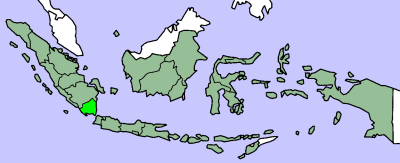Lampung province on target to become major biofuel center

Lampung province in Indonesia is set to become a major production center for biofuels during the next four years, an official noted as he announced that four local companies are spending more than Rp 860 billion (€72.8/US$90.5 million) on bioenergy projects in the province, while a South Korean firm plans to invest more than Rp 90 trillion to build a bioethanol refinery.
- CSM has planted a 20,000 hectare plot of land with cassava as a feedstock for ethanol (10,000 ha in Way Kanan, 5,000 ha in Tulangbawang and another 5,000 ha in North Lampung).
- A project worth Rp 184 billion (€15.6/20.2 million) and managed by PT Acidatama Lampung Chemical Industry in Central Lampung was approved by the provincial administration in 2005.
- In 2006, PT Bio Energi Ind. invested Rp 8.1 billion (€695,000/US$900,000) to build a plant in Tulangbawang regency. That year, three other local firms -- PT Sumi Asih in Bandarlampung, PT Medco Ethanol in Lampung and PT Luhur Prakarsa Maju Dinamika in North Lampung began investing a total of Rp 675.6 billion (€57.2/US$74.2 million).
- Meanwhile, South Korean's PT CSM Corporation has signed a memorandum of understanding with the Lampung administration to invest Rp 90 trillion in the province to build an ethanol refinery in North Lampung.
"We intend to become the center for biofuel in Indonesia. Large companies in Lampung such as PT Sugar Group, which has been producing refined sugar, and the PT Perkebunan Nasional VII state plantation company have built biodiesel and bioethanol plants, along with foreign investors." -- Syaifullah Sesunansaid head of the Lampung Investment, Culture and Tourism Promotion Office.Lampung currently has a plantation area covering 543,800 hectares, producing 367,840 tons of palm oil a year, 5,386,062 tons of cassava annually and 7,101,600 tons of sugarcane yielding 340,876 tons of molasses annually.
Lampung Research and Development Agency head Rellyani was optimistic that biofuel production in Lampung could easily meet 10 percent of the province's energy demands as stipulated in a presidential decree on fuel supply. "Lampung is estimated (currently) consume around 43 million liters of bioethanol annually, while (biofuel) production capacity could reach 740 million liters a year," Rellyani said:
 ethanol :: biodiesel :: biomass :: bioenergy :: biofuels :: energy :: sustainability :: cassava :: sugarcane :: Indonesia ::
ethanol :: biodiesel :: biomass :: bioenergy :: biofuels :: energy :: sustainability :: cassava :: sugarcane :: Indonesia :: "We're confident Lampung could become a bioethanol producing center and supply fuel to the western part of the country, particularly Sumatra and Java," she said. Rellyani estimated local demand for biodiesel at 97 million liters a year, "while production of biodiesel is projected at around 128 million liters annually. This shows a surplus in biodiesel production", she said. Rellyani added that Lampung was more suited to producing bioethanol than biodiesel.
"There is a huge amount of cassava and sugarcane here, and the soil conditions are also suitable to grow these crops."
"Biodiesel is made from palm oil and the jatropha plant. Most farmers prefer to turn palm oil into crude palm oil than biodiesel, while supplies of jatropha are still limited at the moment."
The government wants biofuels to make up 10 percent of total energy production by 2010, however, current production levels are well below this amount.
Total levels will increase, however, with the work of PT Medco Ethanol Lampung (MEL), which has been operating in North Lampung since October, and is targeting production of 60 million liters of bioethanol annually.
The country's first bioethanol plant is currently in the design and construction planning stage. Workers are building access roads to the factory site and securing partnerships with cassava and sugarcane suppliers.
PT MEL project director Panya Siregar said the company planned to invest around $4.12 million in the plant through a project funding scheme. The plant is expected to employ 150 workers and be backed by a supply of around 13,000 ha of cassava plantations, providing around 600,000 working days for farmers annually.
"The factory's presence will have positive impacts on supporting sectors, such as transportation, and create a new distribution network for cassava and sugarcane farmers," Panya said.
The company will also use modern technology to benefit from biogas produced from by-products, he said.
"The factory is designed to produce 180,000 liters of bioethanol daily or an equivalent of 60 million liters annually. In its initial stage, the company is planning to produce high quality ethanol for industry, especially for overseas markets, such as Singapore and Japan," Panya said.
 -------------------
-------------------
 Spanish company Ferry Group is to invest €42/US$55.2 million in a project for the production of biomass fuel pellets in Bulgaria.
The 3-year project consists of establishing plantations of paulownia trees near the city of Tran. Paulownia is a fast-growing tree used for the commercial production of fuel pellets.
Spanish company Ferry Group is to invest €42/US$55.2 million in a project for the production of biomass fuel pellets in Bulgaria.
The 3-year project consists of establishing plantations of paulownia trees near the city of Tran. Paulownia is a fast-growing tree used for the commercial production of fuel pellets.









0 Comments:
Post a Comment
Links to this post:
Create a Link
<< Home